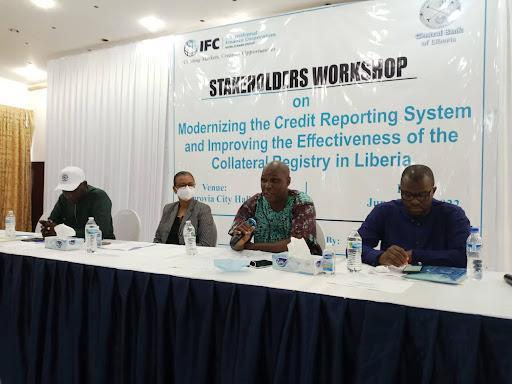Liberia: Weak Credit Reference ‘Hurts’ Liberia’s Economy

From left, Assistant Minister for Economic Policy at MFDP, James Dorbor Na-Kulah Sao, IFC Resident Representative for Liberia and Sierra Leone, Alexandra Celestin, and Deputy Governor for Economic Policy at the Central Bank of Liberia (CBL), Governor Dr. Musa Dukuly speaks.
— CBL Official Says
The Deputy Governor for Economic Policy at the Central Bank of Liberia (CBL), Governor, Dr. Musa Dukuly, has disclosed that sustainable economic growth and financial inclusion are being impeded by the county’s poor collateral registry and weak credit reference.
The CBL official noted that for Liberia’s economy to impact the ordinary people, the country needs to have an effective credit registry and collateral registry framework.
“If we don't strengthen that, it means that agent banking will not be able to provide those services in those areas where commercial traditional banks will not be able to effectively operate. The bank is making headway but not at the pace expected because of some of these constraints,” Dukuly said. “I think enhancing our collateral risk chain and also improving our credit reference will help significantly in increasing our credit growth in the economy because it will help to strengthen confidence."
“We have some of our regions (Liberia) where we don't have banks. Because we don't have a bank in some of the regions we don't increase financial services. But we are trying to navigate our way around by encouraging agent banking. Last year the number of agents banking increased from 188 to 260. The only way agent banking can work effectively is to support the existence of financial services in the regions where we don’t have a bank.”
He added access to financial services acts as a key enabler to promoting economic growth and poverty reduction as financial services provide the tools to invest in income-generating activities and jobs — and in the absence, Liberia will continue to find it difficult to have a sustainable economy which would help reduce poverty.
Dukuly's revelation comes as the Bank has in the past argued that with the country’s high unemployment rate, it is imperative that efforts be dedicated to promoting access to financial services to fuel economic growth while ensuring that consumers’ diverse financial needs are met.
In the broader financial sector and economic context, the Bank said in its four-year strategy plan, that coupled with a highly diminished bank’s appetite for lending, and poor investment opportunities, which constrain the situation more.
However, the CBL has said that Liberia has made progress in terms of increased financial inclusion, but at a rate which is less than 40 percent of the population, and that growth is driven by Mobile Money. It said that the country’s high dependence on Mobile Money is also hurting, as many people do not have access to diverse financial services beyond mobile money account ownership.
The CBL, also in a 2021 report, indicates an increase for non-performing loans — growing from 21.59 percent to 22.69 percent. Accordingly, in 2019, the Bank said, the country’s financial inclusion was around 36 percent, far below its 50 percent target.
Meanwhile, Dukuly has also noted that at present, the country’s credit growth has increased beyond 15 percent but is still below “our counterparts who are having a substantial increase in credit growth.”
He made the assertion on June 23, during the kickoff of a two-day stakeholders workshop on modernizing the credit reporting system and improving the effectiveness of the collateral registry in Liberia — an event which is being organized by the International Finance Corporation (IFC) and World Bank.
In a remark, the International Finance Corporation (IFC) Resident Representative for Liberia and Sierra Leone, Alexandra Celestin, noted that improving the effectiveness of the collateral registry and strengthening the legal and regulatory frameworks to facilitate lending against movable property, will go a long way in boosting lending to the small business owners.
Celestin said the availability of the technology-based system that collects credit information on borrowers and prospective borrowers would help to facilitate the extension of credit to underserved consumers and businesses that will be able to build and leverage reputational collateral to obtain credit, thus promoting financial inclusion.
“The COVID-19 pandemic is causing unprecedented disruptions to the global economy and exposing existing financial sector vulnerabilities. As such, individuals and businesses require financing to survive the pandemic and build capacity during the recovery phase, thereby increasing the demand for credit. Financial institutions’ lending portfolios have been deteriorating and will need to be reprofiled and augmented with new loans to accommodate the impact of COVID,” Celestin said.
According to her, in Sub-Saharan Africa, COVID’s impact is more disproportionate as the effect on livelihoods and micro, small and medium enterprises (MSMEs), most of which are informal and face serious access to finance challenges.
She said it is estimated that, at the height of the pandemic, close to 50 percent of firms have struggled with debt servicing as well as solvency challenges.
“The timing is therefore auspicious for this stakeholder workshop to review existing frameworks — legal, regulatory, institutional — as well as practices that underpin the credit system and adopt workable solutions that will make such frameworks effective in boosting access to finance for MSMEs, most of which are informal in nature,” she said.
